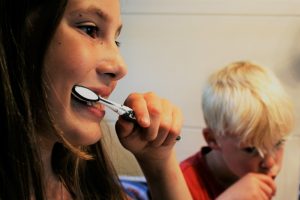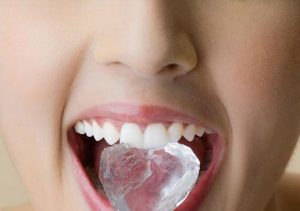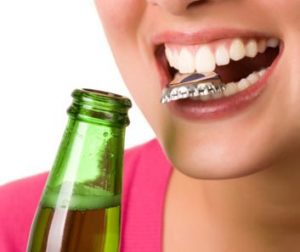Your dentist may tell you that brushing, flossing, getting regular check-ups, and avoiding soda can lead to better teeth. It can, but only to a certain extent. What your dentist doesn’t know is the bad habits you do that unknowingly damage your teeth bit by bit until you suddenly have damaged teeth or a disease in your mouth and you’re not sure how it got there in the first place even though you frequently brush and floss.
Actually, if you practice these habits, you may be harming your dental health. Here’s what you should avoid.
Nail Biting
A lot of people who nail bite don’t do it consciously; for many, it is a coping method used by people who are nervous. However, apart from the mismatched nails and short finger nails, nail biting can slowly chip at your teeth and impact your jaw. When you nail bite, the shape of your jaw changes, and doing so for long periods of time can add too much pressure to your jaw and cause jaw dysfunction.
If you know you have it, it may be difficult to kick the habit since this is an unconscious practice. Finding new ways to handle your stress reduces the chance of nail biting. Fidget spinners and fidget cubes are a trend, but they can be very useful to keep your fingers busy.
Brushing the Wrong Way

When brushing your teeth, it is best to use a soft toothbrush. While your teeth are made of strong minerals, these aren’t the only thing you’re cleaning; consider that your gums and tongue as something much more sensitive that you have to clean as well. Don’t think of it as scrubbing. Instead, think of it as massaging your teeth. Clean your gums and tongue; there are some toothbrushes on the market that come with cheek and tongue cleaners.
Avoid using hard toothbrushes. Some people think that a harder toothbrush is better because they have bigger teeth, or they brush very hard and soft toothbrushes don’t last very long with their method. However, this is a misconception, especially for older adults. A harder toothbrush will irritate sensitive gums, which could expose your dentin and lead to sensitive teeth.
Grinding Your Teeth
When you are sleeping or just have a habit of it, grinding and clenching your teeth slowly wears down the enamel. The enamel is the hard part of your teeth and, once it wears down, exposes the dentin and the nerves inside, causing your teeth to become sensitive and exposing it to cavities. When your teeth are sensitive, you can’t open your mouth very wide, nor can you consume hot and cold food without feeling some sort of pain.
If you suspect you tend to grind your teeth, go to your local dentist. They will provide you with custom mouth guards to prevent you from grinding your teeth at night, preventing damage, pain, and muscle soreness around your mouth.
Chewing Ice Cubes

Ice is made of water, which provides a lot of benefits for your dental health, but in its solid form, ice is a hard material that can chip at your teeth. Think of your teeth as a topaz and ice as a quartz. Your teeth are much harder than ice, but eventually, it will wear out and begin to chip. Slowly, it causes microscopic cracks on your teeth, which could grow worse over time.
Chewing on hard ice may also irritate the insides of a tooth, which may trigger toothaches. Eventually, you may develop sensitive teeth, making it hard to eat cold food. There’s also the fact that ice is cold, and it can cause teeth to fracture.
As much as possible, leave the ice inside the cup. So you won’t be tempted to chew on the ice, use a straw. If you want something to chew on, try sugar-free gum.
Eating Snacks Throughout the Day
When you eat a meal, there’s always going to be some form of bacteria and food ingredients that are harmful for your teeth. But once you brush your teeth, you’re removing the food particles still in your mouth that may cause eventual tooth decay. So, for the rest of the day, your mouth is clean of any large particles that could damage your dental health.
However, if you’re munching on snacks throughout the day, you’re not leaving your teeth with any time to be free of cavities. At any given moment, you have some number of bacteria in your mouth. When you eat and don’t brush your teeth for hours, you’re leaving food particles for bacteria to consume. These bacteria produce acids that cause cavities and weaken your enamel.
Dentists recommend eating balanced meals. Instead of prolonged eating, eat your food in one sitting. It also helps to finish your food with a glass of water to wash away most of the food particles remaining in your teeth.
Causing Your Teeth to Adjust

We’ve all been guilty ofusing our mouths as a substitute for scissors, pliers, or shears at least once in our lives. This is a dangerous practice because while your gums protect your teeth, your teeth can still be moved by strong force or weak but prolonged force.
For example, I have this patient, a teenager who liked to fiddle with her braces and always came for her adjustment with at least one broken bracket. Though she never admitted it, she removed her ligature when she found the wires too painful. Apparently, she lost one of the ligatures and, while she was in school, the arch wire went under the bracket of one of her lower canines. She later called me, crying, saying her canine had seemed to sprout out of her gums. I managed to fix her teeth, but the canine disrupted her entire braces procedure for a while.
Your teeth, therefore, are not in place. They’re made for eating, so when you’re using it as a tool to tear at a bag of chips or hold onto a heavy bag because your hands are full, you are slowly damaging your teeth. You risk cracking or fracturing your teeth or injuring your jaw.
These practices can hinder your dental health, even if you practice good oral hygiene. To achieve a healthy set of teeth paired with healthy gums, tongue, and other internal parts of your teeth, it is best to avoid these practices.
